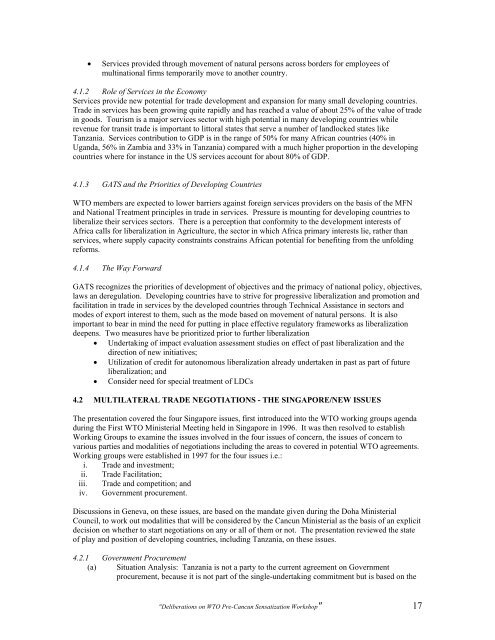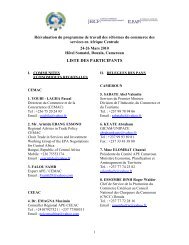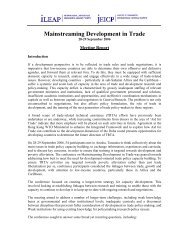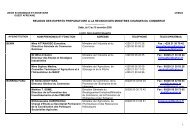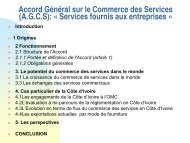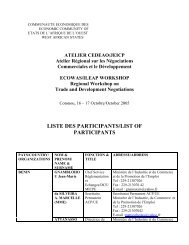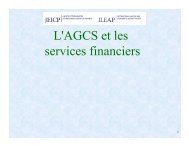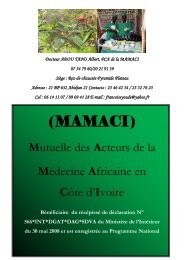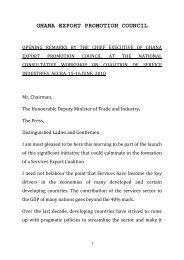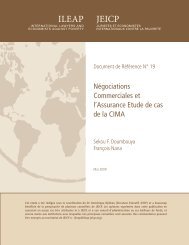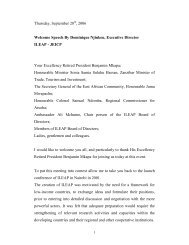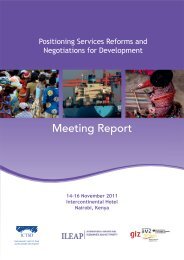Tanzania Report, Dar-Es-Salaam, Tanzania - ILEAP
Tanzania Report, Dar-Es-Salaam, Tanzania - ILEAP
Tanzania Report, Dar-Es-Salaam, Tanzania - ILEAP
You also want an ePaper? Increase the reach of your titles
YUMPU automatically turns print PDFs into web optimized ePapers that Google loves.
• Services provided through movement of natural persons across borders for employees ofmultinational firms temporarily move to another country.4.1.2 Role of Services in the EconomyServices provide new potential for trade development and expansion for many small developing countries.Trade in services has been growing quite rapidly and has reached a value of about 25% of the value of tradein goods. Tourism is a major services sector with high potential in many developing countries whilerevenue for transit trade is important to littoral states that serve a number of landlocked states like<strong>Tanzania</strong>. Services contribution to GDP is in the range of 50% for many African countries (40% inUganda, 56% in Zambia and 33% in <strong>Tanzania</strong>) compared with a much higher proportion in the developingcountries where for instance in the US services account for about 80% of GDP.4.1.3 GATS and the Priorities of Developing CountriesWTO members are expected to lower barriers against foreign services providers on the basis of the MFNand National Treatment principles in trade in services. Pressure is mounting for developing countries toliberalize their services sectors. There is a perception that conformity to the development interests ofAfrica calls for liberalization in Agriculture, the sector in which Africa primary interests lie, rather thanservices, where supply capacity constraints constrains African potential for benefiting from the unfoldingreforms.4.1.4 The Way ForwardGATS recognizes the priorities of development of objectives and the primacy of national policy, objectives,laws an deregulation. Developing countries have to strive for progressive liberalization and promotion andfacilitation in trade in services by the developed countries through Technical Assistance in sectors andmodes of export interest to them, such as the mode based on movement of natural persons. It is alsoimportant to bear in mind the need for putting in place effective regulatory frameworks as liberalizationdeepens. Two measures have be prioritized prior to further liberalization• Undertaking of impact evaluation assessment studies on effect of past liberalization and thedirection of new initiatives;• Utilization of credit for autonomous liberalization already undertaken in past as part of futureliberalization; and• Consider need for special treatment of LDCs4.2 MULTILATERAL TRADE NEGOTIATIONS - THE SINGAPORE/NEW ISSUESThe presentation covered the four Singapore issues, first introduced into the WTO working groups agendaduring the First WTO Ministerial Meeting held in Singapore in 1996. It was then resolved to establishWorking Groups to examine the issues involved in the four issues of concern, the issues of concern tovarious parties and modalities of negotiations including the areas to covered in potential WTO agreements.Working groups were established in 1997 for the four issues i.e.:i. Trade and investment;ii. Trade Facilitation;iii. Trade and competition; andiv. Government procurement.Discussions in Geneva, on these issues, are based on the mandate given during the Doha MinisterialCouncil, to work out modalities that will be considered by the Cancun Ministerial as the basis of an explicitdecision on whether to start negotiations on any or all of them or not. The presentation reviewed the stateof play and position of developing countries, including <strong>Tanzania</strong>, on these issues.4.2.1 Government Procurement(a) Situation Analysis: <strong>Tanzania</strong> is not a party to the current agreement on Governmentprocurement, because it is not part of the single-undertaking commitment but is based on the"Deliberations on WTO Pre-Cancun Sensatization Workshop" 17


